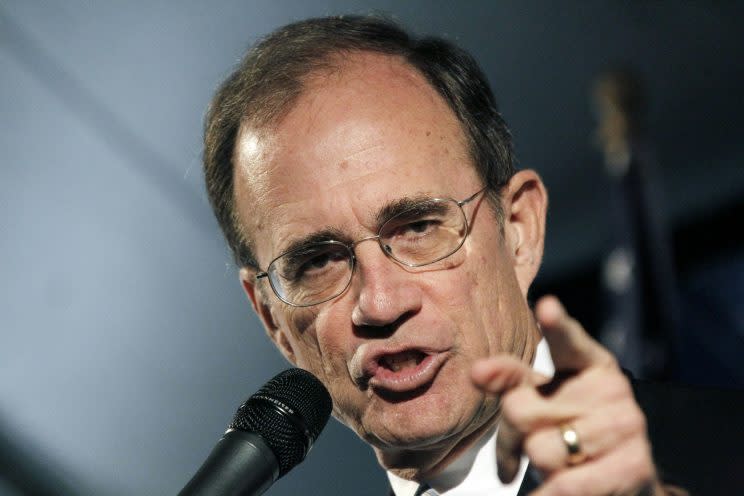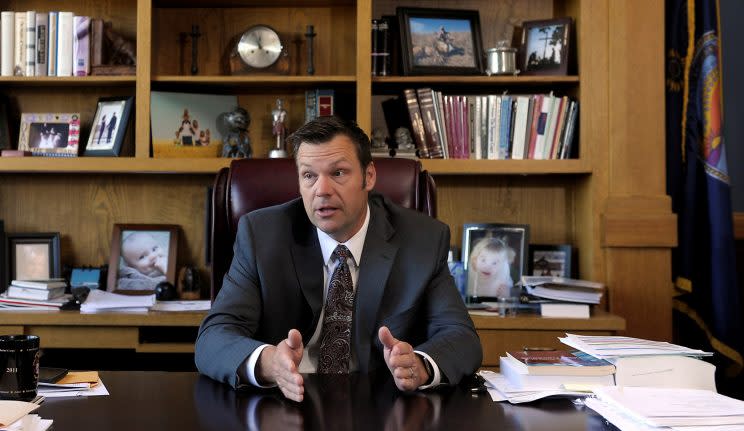Almost every state has declined the White House’s request for voter data
At least 44 states and the District of Columbia are declining to hand over private voter data to the White House’s “election integrity” commission.
The data requests were first issued last week by the Presidential Advisory Commission on Election Integrity, a group formed by President Trump following his unsubstantiated claims of massive voter fraud in the 2016 election. The letters requested information on voters, including birthdays, party affiliation and the last four digits of Social Security numbers. By the end of the day Friday, more than 20 states had declined to participate, and that number ballooned over the long holiday weekend.
Many states — including those with Republican secretaries of state — said state law prevented them from turning over most of the data requested by the commission, but that they would provide information that was available to the public. That includes Indiana, the home state of the commission’s chairman, Vice President Mike Pence, and Kansas, the home state of the vice chair, Kris Kobach.
“While this request has understandably raised concerns with privacy advocates, voter registration information in Nevada is generally available for public inspection under state law, including name, address, date of birth, and whether the voter participated in a prior election,” said Nevada Secretary of State Barbara Cegavske, a Republican, in a statement Friday. “Election officials in Nevada do, however, collect certain information that is not considered a public record under state law and is therefore not available for public inspection. This information includes: Social Security number, driver’s license number, DMV identification card number and email address.”
Other Republicans were slightly less diplomatic in their refusals.
“They can go jump in the Gulf of Mexico, and Mississippi is a great state to launch from,” said Mississippi Secretary of State Delbert Hosemann in a statement last week. “Mississippi residents should celebrate Independence Day and our state’s right to protect the privacy of our citizens by conducting our own electoral processes.”

Louisiana Secretary of State Tom Schedler, also a Republican, joined the chorus on Monday.
“The President’s Commission has quickly politicized its work by asking states for an incredible amount of voter data that I have, time and time again, refused to release,” said Schedler in a statement. “My response to the Commission is, you’re not going to play politics with Louisiana’s voter data, and if you are, then you can purchase the limited public information available by law, to any candidate running for office. That’s it.”
In a Saturday tweet, Trump questioned what the states refusing to comply were hiding: “Numerous states are refusing to give information to the very distinguished VOTER FRAUD PANEL. What are they trying to hide?”
Kobach defended the commission in an interview with CNN’s Anderson Cooper, somewhat contradicting Trump’s tweet.
“First of all, the commission is not to prove or disprove what the president speculated about in January,” said Kobach. “The purpose of the commission is to find facts and put them on the table. Importantly, it’s a bipartisan commission.”
“The commission very clearly is requesting publicly available data in accordance with each state’s laws in an effort to increase the integrity of our election system,” Jarrod Agen, a spokesman for Pence, told the Washington Post in a statement. “The commission’s goal is to protect and preserve the principle of one person, one vote, because the integrity of the vote is the foundation of our democracy.”
Multiple studies have found little evidence of fraud, with a major report in 2014 finding 31 instances of credible fraud out of 1 billion votes cast in general, primary, special and municipal elections since 2000. Kobach, who has announced his intentions to run for governor of Kansas, has been accused by a legal group of violating the Hatch Act, which prevents most executive branch employees from politicking while performing their official duties.
The commission has received some support from state officials, including those in Missouri and Colorado.
“We are very glad they are asking for information before making decisions,” said Colorado Secretary of State Wayne Williams, a Republican. “I wish more federal agencies would ask folks for their opinion and for information before they made decisions.”

Democratic officials and the American Civil Liberties Union have been harsher in their language condemning the panel, which some see as a Republican attempt to suppress votes.
“King of Voter Suppression Kris Kobach and the Trump administration are launching a nationwide assault on voting rights,” said the ACLU in a statement last week.
“That Kobach — who has been successfully sued many times for voter suppression — is now asking for details on every single voter in the U.S. is deeply alarming and raises significant privacy concerns,” said Dale Ho, director of the ACLU’s Voting Rights Project. “States are right to balk at turning over massive reams of personal information in what clearly is a campaign to suppress the vote.”
“As I’ve said before,” wrote Minnesota Secretary of State Steve Simon in a statement Friday, “I have serious doubts about the commission’s credibility and trustworthiness. Its two co-chairs have publicly backed President Trump’s false and irresponsible claim that millions of ineligible votes were cast in the last election. They, along with other recent appointees, appear to have a strong interest in steering the commission toward their pre-determined conclusions and outcomes. I fear that the commission risks becoming a partisan tool to shut out millions of eligible American voters.”
“I find this request repugnant,” said Maryland Secretary of State Brian Frosh in a tweet Monday. “[It] appears designed only 2 intimidate voters and 2 indulge the President’s fantasy that he won the popular vote.”
According to analysis from CNN, the six states yet to respond to the requests are Arkansas, Florida, Hawaii, Illinois, Nebraska and New Jersey.
_____
Read more from Yahoo News:


